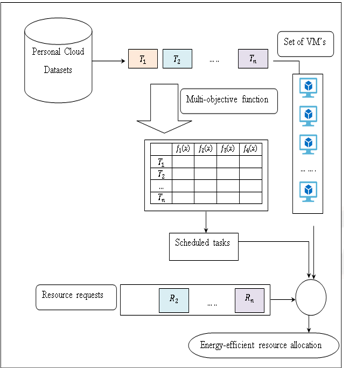Hypervolume Sen Task Scheduilng and Multi Objective Deep Auto Encoder based Resource Allocation in Cloud
Main Article Content
Abstract
Cloud Computing (CC) environment has restructured the Information Age by empowering on demand dispensing of resources on a pay-per-use base. Resource Scheduling and allocation is an approach of ascertaining schedule on which tasks should be carried out. Owing to the heterogeneity nature of resources, scheduling of resources in CC environment is considered as an intricate task. Allocating best resource for a cloud request remains a complicated task and the issue of identifying the best resource – task pair according to user requirements is considered as an optimization issue. Therefore the main objective of the Cloud Server remains in scheduling the tasks and allocating the resources in an optimal manner. In this work an optimized task scheduled resource allocation model is designed to effectively address large numbers of task request arriving from cloud users, while maintaining enhanced Quality of Service (QoS). The cloud user task requests are mapped in an optimal manner to cloud resources. The optimization process is carried out using the proposed Multi-objective Auto-encoder Deep Neural Network-based (MA-DNN) method which is a combination of Sen’s Multi-objective functions and Auto-encoder Deep Neural Network model. First tasks scheduling is performed by applying Hypervolume-based Sen’s Multi-objective programming model. With this, multi-objective optimization (i.e., optimization of cost and time during the scheduling of tasks) is performed by means of Hypervolume-based Sen’s Multi-objective programming. Second, Auto-encoder Deep Neural Network-based Resource allocation is performed with the scheduled tasks that in turn allocate the resources by utilizing Jensen–Shannon divergence function. The Jensen–Shannon divergence function has the advantage of minimizing the energy consumption that only with higher divergence results, mapping is performed, therefore improving the energy consumption to a greater extent. Finally, mapping tasks with the corresponding resources using Kronecker Delta function improves the makespan significantly. To show the efficiency of Multi-objective Auto-encoder Deep Neural Network-based (MA-DNN) cloud time scheduling and optimization between tasks and resources in the CC environment, we also perform thorough experiments on the basis of realistic traces derived from Personal Cloud Datasets. The experimental results show that compared with RAA-PI-NSGAII and DRL, MA-DNN not only significantly accelerates the task scheduling efficiency, task scheduling time but also reduces the energy usage and makespan considerably.
Article Details
References
Jing Chen, Tiantian Du, Gongyi Xiao, “A multi-objective optimization for resource allocation of emergent demands in cloud computing”, Journal of Cloud Computing: Advances, Systems and Applications, Springer, Oct 2021[Cloud Resource Allocation Algorithm based on a Parallel and Improved Non-dominated Sorting Genetic Algorithm II (RAA-PI-NSGAII)]
Zhiping Peng, Jianpeng Lin, Delong Cui, Qirui Li, Jieguang He, “A multi-objective trade-off framework for cloud resource scheduling based on the Deep Q-network algorithm”, Cluster Computing, Springer, Jan 2020 [deep reinforcement learning (DRL)]
Sanjaya Kumar Panda, Shradha Surachita Nand, Sourav Kumar Bhoi, “A pair-based task scheduling algorithm for cloud computing environment”, Journal of King Saud University – Computer and Information Sciences, Elsevier, Oct 2018
Vadlamaani , S. M., P. K. . Bharti, and M. R. . Kumar. “Generalized Statistical Indicators For Cloud Computing Fault Tolerance”. International Journal of Intelligent Systems and Applications in Engineering, vol. 10, no. 1s, Oct. 2022, pp. 269 -281.
D. Selvapandian, R. Santhosh, “A Hybrid Optimized Resource Allocation Model for Multi-Cloud Environment Using Bat and Particle Swarm Optimization Algorithms”, Institute of Fundamental Technological Research, Oct 2022
Abid Ali and Muhammad Munwar Iqbal, “A Cost and Energy Efficient Task Scheduling Technique to Offload Microservices Based Applications in Mobile Cloud Computing”, IEEE Access, May 2022
Priyadarsini Karthik, Karthik Sekhar, “Resource scheduling approach in cloud Testing as a Service using deep reinforcement learning algorithms”, CAAI Transactions on Intelligence Technology, Wiley, Feb 2021
Said Nabi, Muhammad Ibrahim, Jose M. Jimenez, “DRALBA: Dynamic and Resource Aware Load Balanced Scheduling Approach for Cloud Computing”, IEEE Access, Apr 2021
Chu-ge Wu, Wei Li, Ling Wanga, Albert Y. Zomaya, “An evolutionary fuzzy scheduler for multi-objective resource allocation in fog computing”, Future Generation Computer Systems, Elsevier, Feb 2021
Hadeer Mahmoud, Mostafa Thabet, Mohamed H. Khafagy, Fatma A. Omara, “Multiobjective Task Scheduling in Cloud Environment Using Decision Tree Algorithm”, IEEE Access, Mar 2022
Hoa Tran-Dang, Sanjay Bhardwaj, Tariq Rahim, Arslan Musaddiq, and Dong-Seong Kim, “Reinforcement Learning based Resource Management for Fog Computing Environment: Literature Review, Challenges, and Open Issues”, Journal of Communications and Networks, Vol. 24, No. 1, Feb 2022
M. O. Agbaje, O. B. Ohwo, T. G. Ayanwola, and Ogunyolu Olufunmilola, “A Survey of Game-Theoretic Approach for Resource Management in Cloud Computing”, Journal of Computer Networks and Communications, Hindawi, Apr 2022
A. S. Abohamama, Amir El?Ghamry, Eslam Hamouda, “Real?Time Task Scheduling Algorithm for IoT?Based Applications in the Cloud–Fog Environment”, Journal of Network and Systems Management, Springer, May 2022
Amira A. Amer, Ihab E. Talkhan, Reem Ahmed, Tawfik Ismail,, “An Optimized Collaborative Scheduling Algorithm for Prioritized Tasks with Shared Resources in Mobile?Edge and Cloud Computing Systems”, Mobile Networks and Applications, Springer, Feb 2022
Arif Ullah, Aziza Chakir, “Improvement for tasks allocation system in VM for cloud datacenter using modified bat algorithm”, Multimedia Tools and Applications, Springer, Mar 2022
S. Phani Praveen, K. Thirupathi Rao, B. Janakiramaiah, “Effective Allocation of Resources and Task Scheduling in Cloud Environment using Social Group Optimization”, Arabian Journal for Science and Engineering, Springer, Oct 2017
Mahendra Bhatu Gawali, Subhash K. Shinde, “Task scheduling and resource allocation in cloud computing using a heuristic approach”, Journal of Cloud Computing: Advances, Systems and Applications, Springer, Oct 2018
Varun Jasuja, Rajesh Kumar Singh “Enhanced MBFD Algorithm to Minimize Energy Consumption in Cloud”, International Journal of Computer Engineering in Research Trends, , vol. 6, no. 2, Feb. 2019, pp. 266 -271.
Harvinder Singh, Anshu Bhasin, Parag Ravikant Kaveri, “QRAS: efficient resource allocation for task scheduling in cloud computing”, Applied Sciences, Springer, Jul 2021
Huafeng Yu, “Evaluation of cloud computing resource scheduling based on improved optimization algorithm”, Complex & Intelligent Systems, Springer, Sep 2020.

